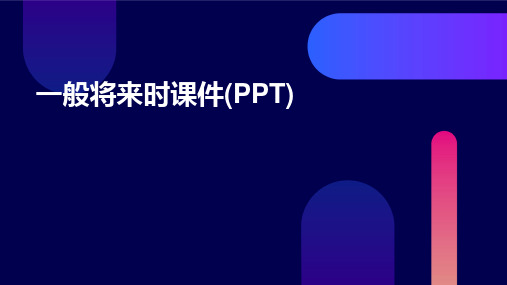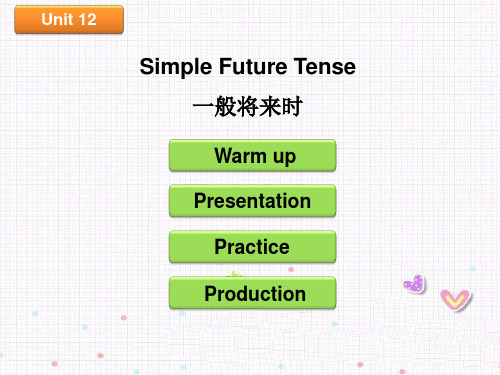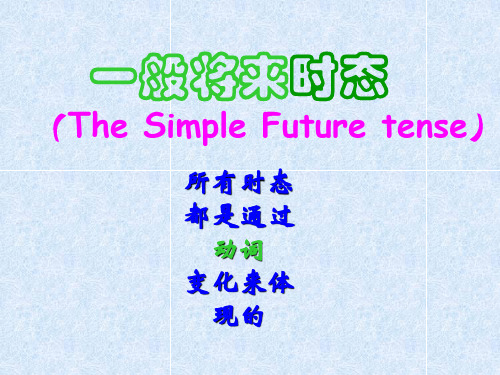一般将来时态讲解(共25张PPT)
(完整版)一般将来时课件(PPT)

2.与“next一家” 连用
next
time year week month term Monday at 7:00 next Sunday morning ……
2.He will find some meat in the fridge soon. (变一般疑问句) W __i_ll he _f_in_d _a_n_y_ meat in the fridge?
3.She will stay there in a week. (对划线部分提问) __H_o_w _s_o_on_ w_i_ll__ she _s_t_a_y_ there?
We will/shall go to Beingjing next week.
He will go to Beingjing next week
(2).变一般疑问句和否定句:
They will have an English party next week. Will they have an English party next week?
2. be going to+do可表示事先计划的意图,而 will 则表示说话人当时决定的意图;
We're going to drive you home after the meeting. Don't call a taxi. We'll drive you home.
I feel ill now, and I'll go to see the doctor. I'm going to see the doctor this evening.
一般将来时课件(PPT)

“be able to”表示将来有能力做某 事时,使用一般将来时形式,例如“I will be able to help you”。
情态动词如“can”、“may”、 “must”等,在一般将来时中通常直 接加动词原形,例如“I can swim”。
03
一般将来时在句子中的运用
陈述句中的使用
表示将要发生的动作或存在的状态
纠正方法
应使用正确的将来时形式,如 "He will go to the park tomorrow." 或 "He is going to the park tomorrow."
忽略动词变化规则
错误示例
They will play football in the future.(忽略了动词play在将来时中的变化)
纠正方法
在将来时中,应使用正确的助动词或情态动词形式,如 "I will be able to help you with your homework." 或 "I can help you with your homework."
错误示例
He will must finish his work before leaving.(错误地使 用了情态动词must)
作用
用于表示未来的计划、打算、预测、 假设等。
常见表达形式
will + 动词原形
表示将来的动作或状态,如“I will go to the park tomorrow.”(我明天将去公园。)
be going to + 动词原形
表示计划、打算或即将发生的动作,如“I am going to study hard this semester.”(我这 学期打算努力学习。)
初中英语一般将来时语法讲解 课件(共26张PPT)

PART 03
be going to +动词原形
1. 基本句型 (1) 肯定句:主语+be(am, is, are) going to +动词原形 +其他。 I’m going to see my friends this week.
(2)否定句:主语+be(am, is, are) not going to +动词原 形+其他。 I’m not going to see my friends this week.
2. 用法
(1)“be going to +动词原形”用于表示主观上打算将 来要做某事,这种打算往往是事先安排好的或表示可能 要发生或肯定要发生的事情。例如:
He’s going to learn English next term. I’m going to see her tomorrow.
(2)根据已有迹象,可能要发生的情况。如: Look at the black clouds! It is going to rain. (3)如果表示计划去某地,可以直接用be going to +地 点。 We are going to Beijing for a holiday. Jim is going to Shanghai by plane.
4.The boy ______ (go) to the middle school next year.
5. There _______ (be) a meeting next month.
2. 用法 (1)表示将要发生的动作或状态,常用的时间状语有: later, in the future, soon, from now on, tomorrow, in+一段 时间, next time/week/month/year等。
一般将来时课件ppt(共17张PPT)

Jim going to
afternoon?
in the playground tomorrow
4. .Jim is going to play football in the playground tomorrow afternoon.
Jim going to play football tomorrow afternoon?
2)在浊辅音和元音后读/d/.
一般过去时, 要用动词过去式. Jim is going to play football in the playground tomorrow afternoon.
Jim is going to play football in the playground tomorrow afternoon. ⑵are变为were。
there were many beautiful flowers there. 一般将来时表示将来某个时间要发生的动作或存在的状态常与表示将来的时间状语连用
⑴am ,is变为was。
So she They to read some books.
What did they do in the park? 1)在清辅音后读/t/ .
(3).动词过去式变化规则
a)一般情况下,直接加ed.如:wash--washed, look---looked; b)以不发音字母e结尾的,加d.如:like---
liked, dance---danced; c)以“辅音字母+y”结尾的,变y为i再加ed. 如:study---studied;
food and (play) lots of games. They
(come) home at 4:30.
通用版英语六年级下册一般将来时 课件 (共43张PPT)

tomorrow明天 tomorrow morning 明天早上 tomorrow afternoon 明天下午 tomorrow evening明天晚上 the day after tomorrow后天
next 系列
next time下次 next week下周 next month下个月 next summer/winter holida明年暑假/寒假 next year明年
B. going
C. goes
D. went
Summary
1.掌握一般将来时的定义 2.掌握一般将来时的结构 3.掌握一般将来时的时间标志词 4.掌握be going to+动原 和will+动原的区别 5.掌握一般将来时的句型转换 6.掌握一般将来时 的特殊用法
特殊疑问句 :特殊疑问词 + 一般疑问句?
1 I am going to swim tomorrow. What are you going to do tomorrow?
2 I am going to swim with my brother tomorrow. Who are you going to swim with tomorrow?
即学即练
4.He will paint it pink. (一般疑问句) Will he paint it pink?
5. There will be a sports meeting next week.(否定句) There will not be a sports meeting next week.
in+将来的年份(在…….年)
in+时间段 表示“m now on 从现在开始 in the future 在未来 in future 不久 before long不久之后 Soon 很快 Tonight在今晚 one day 有一天 some day某天 this afternoon/evening今天下午/晚上
英语时态一般将来时25页PPT

中考链接
1.My sister wants a new dress. She ___ it to the party.
A.wears B.has worn C.wore D.is going to wear
2. Don’t worry he ____ here as soon as the meeting is over.
1(be to) 2(be about to) 3(be due to)
三者均表示计划或打算即将要发生的 动作;
但2一般的用法是表客观即将发生之 事,否定句中才表主语的计划性。
4现在进行时表将来
现在进行时表将来的动作,谓语 通常为瞬间动词。如: come, go, arrive, leave start, return, stay, meet, get 等。
英语时态一般将来时
11、获得的成功越大,就越令人高兴 。野心 是使人 勤奋的 原因, 节制使 人枯萎 。 12、不问收获,只问耕耘。如同种树 ,先有 根茎, 再有枝 叶,尔 后花实 ,好好 劳动, 不要想 太多, 那样只 会使人 胆孝懒 惰,因 为不实 践,甚 至不接 触社会 ,难道 你是野 人。(名 言网) 13、不怕,不悔(虽然只有四个字,但 常看常 新。 14、我在心里默默地为每一个人祝福 。我爱 自己, 我用清 洁与节 制来珍 惜我的 身体, 我用智 慧和知 识充实 我的头 脑。 15、这世上的一切都借希望而完成。 农夫不 会播下 一粒玉 米,如 果他不 曾希望 它长成 种籽; 单身汉 不会娶 妻,如 果他不 曾希望 有小孩 ;商人 或手艺 人不会 工作, 如果他 不曾希 望因此 而有收 益。-- 马钉路 德。
(三)一般将来时的句式转换
1.否定 2.疑问 a.一般疑问
初中英语 一般将来时课件(PPT18张)

Ⅳ.一般将来时的被动语态
一般将来时的被动语态表示“…将要被…”,其常用的表达形式有以下几种:
一般将来时被动语态:
will/shall + be /get done (表示意想不到的要发生的事情)
be going to be + done (表示按计划或安排发生的被动动作) be about to be + done (指将要发生的事情)
2.They ________ an English evening next Sunday. A. are having B. are going to have C. will having D. is going to have
3.—Tell him about the news when he _______, John.
考点2:考察一般将来时的不同表达方式
1.– Will his parents go to see the Terra Cotta Warriors tomorrow? – No, ________ (不去).
A. they willn’t. B. they won’t. C. they aren’t. D. they don’t.
基本结构:
1.主语+will/shall+do sth 2.主语+am/is/are+going to+do sth
3. 主表语示+位am移/is的/ar动e+词do可ing用s现th 在进行时表将来 4. 主特语定+时do间sth和条件状语从句可用一般将来时表将来
5.主语+am/is/are+(about)+to+do sth 注:之所以不用be是因为这是一般将来时,而be还包括过去式的 was、were
小学英语语法课件- 一般将来时 (共36张PPT) 全国通用

Presentation Sentences
She will take swimming lessons in this vacation. 她今年假期要去学游泳。 She is going to go shopping tomorrow. 她明天要去购物。 Jim will open a shop on internet. 吉姆打算要在网络上开个店。 Jim is going to be an actor when he grows up. Jim长大了想当一名演员。
___t_o_m_o_r_ro_w_.____________________________ 一般疑问句:A__re_t_h_e_c_h_il_d_re_n_g_o_i_ng__to__w_a_tc_h_a_d_o_l_p_h_in_s_h_o_w__
t_o_m_o_r_ro_w_?____________________________ There will be a great concert next week. 否定句:_T_h_e_r_e_w_il_l _n_o_t b_e__a_g_re_a_t_c_o_n_ce_r_t _n_ex_t_w_e_e_k_. ______ 一般疑问句:_W_i_ll_th_e_r_e_b_e_a_g_r_e_a_t _co_n_c_e_rt_n_e_x_t_w_e_e_k?______
Practice Oral Practice
小组合作完成单项选择,并朗读句子
( C ) There __________ a meeting tomorrow afternoon.
A. will be going to
B. will going to be
C. is going to be
通用版 小学英语小升初 语法句型转换-一般将来时 课件(共27张PPT)

通用版小学英语小升初语法句型转换-一般将来时课件(共27张PPT)(共27张PPT)一般将来时simple future tense一般将来时表示:①将来某个时间要发生的动作或存在的状态,②也可以表示将来经常发生的动作,③常与表示将来的时间状语连用。
一般将来时的定义be going to +动词原形表示打算、准备做某事或即将发生/肯定要发生某事。
当主语是I 时,be 用am;当主语是第三人称单数时,be 用is;当主语是其他人称时,be 用are。
2. will/ shall +动词原形表示将要发生的动作或情况,没有太多的计划性,还可用来表示意愿。
主语是第一人称时常用shall,也可用will;其他情况全部用will。
一般将来时的句式结构(1)肯定句一般将来时的句式结构如:I am going to the cinema tonight.今晚我打算去电影院。
My brother is going to buy a pair of shoes this afternoon.今天下午我哥哥打算去买一双鞋。
主语+ be going to +动词原形.一般将来时的句式结构(2)否定句:主语+ be + not going to +动词原形+其他.如:I am not going to plant trees this weekend. 这个周末我不打算去种树。
They aren’t going to climb mountains this week.这周他们不打算去爬山。
(3)一般疑问句及答语:be动词提前,剩下照抄,句末挂问号。
Be +主语+ going to +动词原形+其他肯定回答:Yes, 主语+ is/ are/ am.否定回答:No, 主语+ isn’t/ aren’t 或I’m not.一般将来时的句式结构(3)一般疑问句及答语:如:—Are you going to the park next week下周你打算去公园吗?—Yes, I am. 是的,我打算去。
一般将来时课件PPT

an r SWe (What is he going to do?)
的状 will 引导的一般将来时:表示将来发生的动作或存在 3 最基本的结构:will + 动词原形
“主谓(宾)句型”的一般将来时:
肯定宾语)+其他
Some day people win go to the moon .
It is going to drink/eat.
will
What are they going to do this evening? They are going to watch TV
will wZJ
What are they going to do ?
They are going to dance.
1. He' 11come back in three years. 他三年以后回来*
2. He,11 come back after three o,clock. 他三点钟以后回来口
1 .1 will call you this evening. 2.Students will use computers to learn in the future. 3・Hewill help his sister with her lessons*
3、 shall与will的区别:
卜辅聊 o rshall
shall常用于第一人称.
否定式:shall not =
《
式
i'win常用于修二、三人称,但
lwill 在口语中各种人称都可以用will.
否定式:will not =
will句式总结:
帝定
否走
1 般统同
日答
小学英语一般将来时ppt课件

六、同义句:be going to = will I am going to go swimming tomorrow(明天).
= I will go swimming tomorrow. 七、be going to和will 的区别 be going to和will 的用法虽然都表示将来发生动作或情况, 但它们的用法是有区别的。
19
四、一般疑问句: be或will提到句首,some改为any, and改 为or, 第一二人称互换。 例如:We are going to go on an outing this weekend.
→ Are you going to go on an outing this weekend? 五、对划线部分提问。一般情况,一般将来时的对划线部分有 三种情况。
17
将来时的否定句
• 在be后加not • 在will后加not • will not=won’t • I’m going to have a picnic this afternoon. 改为否定句: He will come back in two days’ time. 改为否定句:
18
一般将来时讲解与练习
1. 问人。Who 例如:I’m going to New York soon. →Who’s going to New York soon. 2. 问干什么。What … do. 例如: My father is going to watch a race with me this afternoon. →What is your father going to do with you this afternoon. 3. 问什么时候。When. 例如:She’s going to go to bed at nine. →When is she going to bed?
(完整版)一般将来时课件(PPT)

2.与“next一家” 连用
next
time year week month term Monday at 7:00 next Sunday morning ……
6. He usually _g_e_t_s (get) up at 6 in the morning. Look! He i_s_g_e_t_t_in(gget) up now. But yesterday he _g_o_t_ (get) up very late, so he _w_e_n_t (go) to
①
②
③
① Who will have an English party next week ?
② What will they have next week ?
③ When will they have an English party?
2. be going to 表将来
will 和be going to 的区别
2.He will find some meat in the fridge soon. (变一般疑问句) W __i_ll he _f_in_d _a_n_y_ meat in the fridge?
3.She will stay there in a week. (对划线部分提问) __H_o_w _s_o_on_ w_i_ll__ she _s_t_a_y_ there?
good. 4.What time _w__ill_ you _g_e_t_ (get) to
2024版高中一般将来时PPT课件图文

表示客观必然性
有些情况下,一般将来时 可以表示客观必然性,如 The sun will rise tomorrow.
05 练习题及答案解 析
填空题专项训练
根据句意和所给汉语 提示,填写正确的动 词形式。
根据语境和时态提示, 填入正确的动词形式, 完成句子。
用所给动词的适当形 式填空,使句子意思 完整、通顺。
计划和打算
一般将来时也可以用于表达个人的计划、打算或安排,例如:They will arrive at the airport at 9:00.(他们将于9点到达机场。)
条件和可能性表达
条件状语从句
在if或unless等引导的条件状语从句中,主句用一般将来时,从 句用一般现在时表示将来,例如:If it doesn't rain tomorrow, we will go for a picnic.(如果明天不下雨,我们就去野餐。)
礼貌原则在跨文化交际中应用
尊重对方文化
01
在跨文化交际中,应尊重对方的文化背景和习惯,避免使用可
能引起误解或冲突的未来表达方式。
谨慎承诺
02
在不确定能否履行承诺的情况下,应谨慎使用过于确定的未来
表达方式,以免造成不必要的误解或压力。
适时调整
03
根据交际的进展和对方的反馈,适时调整自己的未来表达方式,
或存在的状态。
否定句
主语 + will/shall + not + 动词原 形,表示将来某个时间不会发生的 动作或不存在的状态。
疑问句
Will/Shall + 主语 + 动词原形,用 于询问将来某个时间是否要发生某 个动作或存在某个状态。
英语语法一般将来时 课件 (共35张PPT)

选择:要动动脑啦
1. My younger brother ____be 15 years old next year.
A. will B. is going C. should
2. — Sorry, I forgot to post the letter for you.
— Never mind, _____ post it myself tonight.
Vicky w__ill__be_ 15 years old next year.(be) Vicky 明年15岁了
Will 表示单纯“将要,将来会”无计划性,陈 述事实
三、句型变化 1. 肯定句: 主语+ will +V原型
I will be a teacher in the future. 2.否定句:主语 + will not(won’t)+V原型
be 随主语有am is are 变化
1. 肯定句: 主语 + be going to + V原型
I am going to fly kites the day after tomorrow.
2. 否定句:主语 + be not going to + V原型
She is not going to be a doctor when she grows up.
B: He will go to Australia. A:What will he do?
B: He will see kangaroos
2.be going to+动词原形
be going to ①表示计划,安排要做的事 ②表示现在的迹象推断未来可能
初中英语课件:一般将来时(共26张PPT)

There______a sports meeting next week.
D. will be
Hurry up,or we______late.
A. come B. will come C. comes D. came
Simple Future Tense 一般将来时
学习目标(Learning aims): 1. 要求学生掌握一般将来时的结构, 用法, 常用时间标志。 2.能够了解一般将来时的易考点和 易错点。 3. 能够在生活中运用将来时态,感 受语言魅力。
1.Life line——If it is long and thick, you will have a long and healthy life. If it's broken, you will be ill.
You won't worry about failure.
If you are doing your best, you won't worry about failure.
to remember your sentenc
You won't hit high.
If you don't aim high, you won't hit high.
will
Guessing game!What will the cats do
They will play the piano
Guessing game!
Where will you go?
We will go to the zoo.
Guessing game!
When will we start
We will start at ten past te
- 1、下载文档前请自行甄别文档内容的完整性,平台不提供额外的编辑、内容补充、找答案等附加服务。
- 2、"仅部分预览"的文档,不可在线预览部分如存在完整性等问题,可反馈申请退款(可完整预览的文档不适用该条件!)。
- 3、如文档侵犯您的权益,请联系客服反馈,我们会尽快为您处理(人工客服工作时间:9:00-18:30)。
• I don't think the test will be very difficult. 。
②用于“祈使句 + and + 陈述句” 中
I don’t think it will rain this afternoon.
I am hungry. I think I’ll have something to eat.
表示看法,观点
“There be”句型的一般将来时 肯定句: There will be +名词+其他成份 [注意]:无论后面加单数名词或复数形式,be都必须用原形。
shall适用于第一人称I,We;而will适用于所有人称。 通常可以用will来代替shall。 will,shall均可缩写为:'ll,如:
I will= I'll; she will = she’ll;will not 和shall not分别可以 缩写为 won't 和shan't。
1.一般将来时的用法
4. be about to + 动词原形。 表示 (1)“即将做”或“马上做”
(2)因此,句子不能再用时间状语。
Don’t leave. Li Lei is about to come. 不要走了,李蕾就要来了。 Be quiet. The concert is about to start. 安静下来,音乐演唱会就要开始了。
• My uncle will come to see me every Saturday.
• 我叔叔每个星期六都会来看我。
• The students will have five English classes per week this term.
• 本学期学生们每周要上五节英语课。
③表示同意或答应做某事
以下协议书: 一、工程概况
工 程 名 称 :________ 工 程 造 价 :________元 整
工 程 地 点 :________ 二、经营管理
1、 甲 方 同 意 乙方挂 靠在甲 方公司 下进行 ________建 筑 工程的 经营,乙 方挂 靠期间 以 甲 方 项 目 经理部 名义自 主经营 、独立 核算、 自负盈 亏。工 程任务 自行承 揽。
• 注意:在口语中,常用will / shall + be doing结构来代替will / shall + 动词原形, 以表示生动。
• I‘ll be seeing a friend off at the airport.
• He'll be going with us tomorrow.
②表示将来某一段时间内经常发 生的动作或存在的状态。
There will be only one country. 否定句:在will后面加not.
There won’t be only one country. 一般疑问句:把will提到there之前。
Will there be only one country? Yes, there will. / No, there won’t.
先安排好的动作。 • 此类动词有:be, arrive, begin, come, start, depart, end,
leave, go, sail, stop, return, dine, finish, open, close,stay etc.
• Is there a film tonight? 今晚有电影吗? • I write my paper tomorrow. • Tomorrow is Christmas Day. • When does the ship sail? • She retires next month. • How long does he stay? • The plane takes off at eight and arrives in
will 引导的一般将来时的各种句式
最基本的结构:will + 动词原形 “主谓(宾)句型”的一般将来时: 肯定句:主语+ will +动词原形+(宾语)+其他
Some day people will go to the moon.
否定句:在will 的后面加not即可。will not 可缩写为 won’t
3. be to + 动词原形。
表示 (1)常规性的活动
(2) 约定、命令、禁止或按计划要做的事情。
Who is to clean the classroom today? 今天该谁打扫教室了? The bridge is to be completed by the end of this year. 这渡桥该在今年年底前完工。 You are not to play with fire. 你不准玩火。
5.主将从现句中,一般现在时表将来 if ,when, as soon as,unless, the time,till/untill
You will not succeed unless you work harder. (期中考试题目)
• 一般现在时表将来 • 表示按时间表timetable将要发生的动作或事件,或者事
• ①表示将来某一时间将要发生的动作或 存在的状态, I shall be free this afternoon.
• There'll be no chemistry classes tomorrow.
• They will probably go to Shanghai for their holiday.
you
are
(be) not better in the evening.
• 3.其他一般将来时态结构
• 1.现在进行时表将来(be + doing) • 表示某个按最近的计划或安排即将要进行的动作,an arrangement
for the near • future或即将开始或结束的动作。
• 常用动词位置移动词:go, leave, come, arrive, land, meet, move, return, start, stay, stop, do, dine, give, have, pay, join, publish, spend, sleep, take, change, fly, work, wear, see, play etc.
They won’t use books.
一般疑问句:把will 提到句子主语之前,结尾变问号。
Will students go to school in the future?
特殊疑问句:特殊疑问词+will +主语+动词原形+其他?
What will your dream school have?
Beijing at eleven.
4.一般将来时的常用结构
• ①用于“I expect, I‘m sure, I think, I wonder + 宾语从句”中
• Don't worry about the exam. I'm sure you'll pass.
• 不要担心这次考试,我确信你会通过的。
质 量 ,安 全 施 工,文明 施工和 按期完 工。 4、 甲 方 向 乙 方提供 承接工 程任务 的公司 资质,向 乙方 提供工 程报
但有时不一定指未来的事情
• 用于I think (don’t think) …will…的句型:
e.g. I think Diana will pass the exam.
4.Robots will do
(do) lots of work in our homes
in the future.
5.There will be
(be) strong winds tonight.
6.He will be
(be) back in three hours.
7.We will send (send) for a doctor if
• He is meeting the manager tomorrow.他明天要见经理。 • I'm changing my hotel.我打算换旅馆。 • Imagine I'm seeing the Mona Lisa.你想想啊---我终于要见到《蒙娜丽
莎》这幅画了。 • The sun is setting.太阳就要落山了。(即将开始) • !注意:现在进行时表将来有时含有“决心”做某事的意思。 • I am not leaving tomorrow. • I'm not staying with you. • When I grow up, I'm flying to the moon.我长大了要飞到月球上去。
2、 挂 靠 期 间 因乙方 以甲方 的名义 承建工 程项目 ,所以 甲方有 责任对 工程负 责,凡以 甲 方 名 义 签 订的施 工协议 ,乙方必 须无条 件执行 甲方与 建设方 签订的 施工协 议条款
及 本 工 程 相 关的其 他协议 。
3、 挂 靠 期 间 乙方实 行大包 干施工 ,包质 量,包工 期, 包 安 全 ,包 材 料采购 ,包人员 与施工 组织。 施工期 间乙方 必须自 觉维护甲方的企业信 誉 ,严 格 按 照 国家现 行的施 工技术 规范和 验收标 准以及 施工图 纸进行 施工,确保工程
用所给词的适当形式填空:
1.There will be (be ) an American film next week.
2.They will finish (finish) the work this afternoon.
